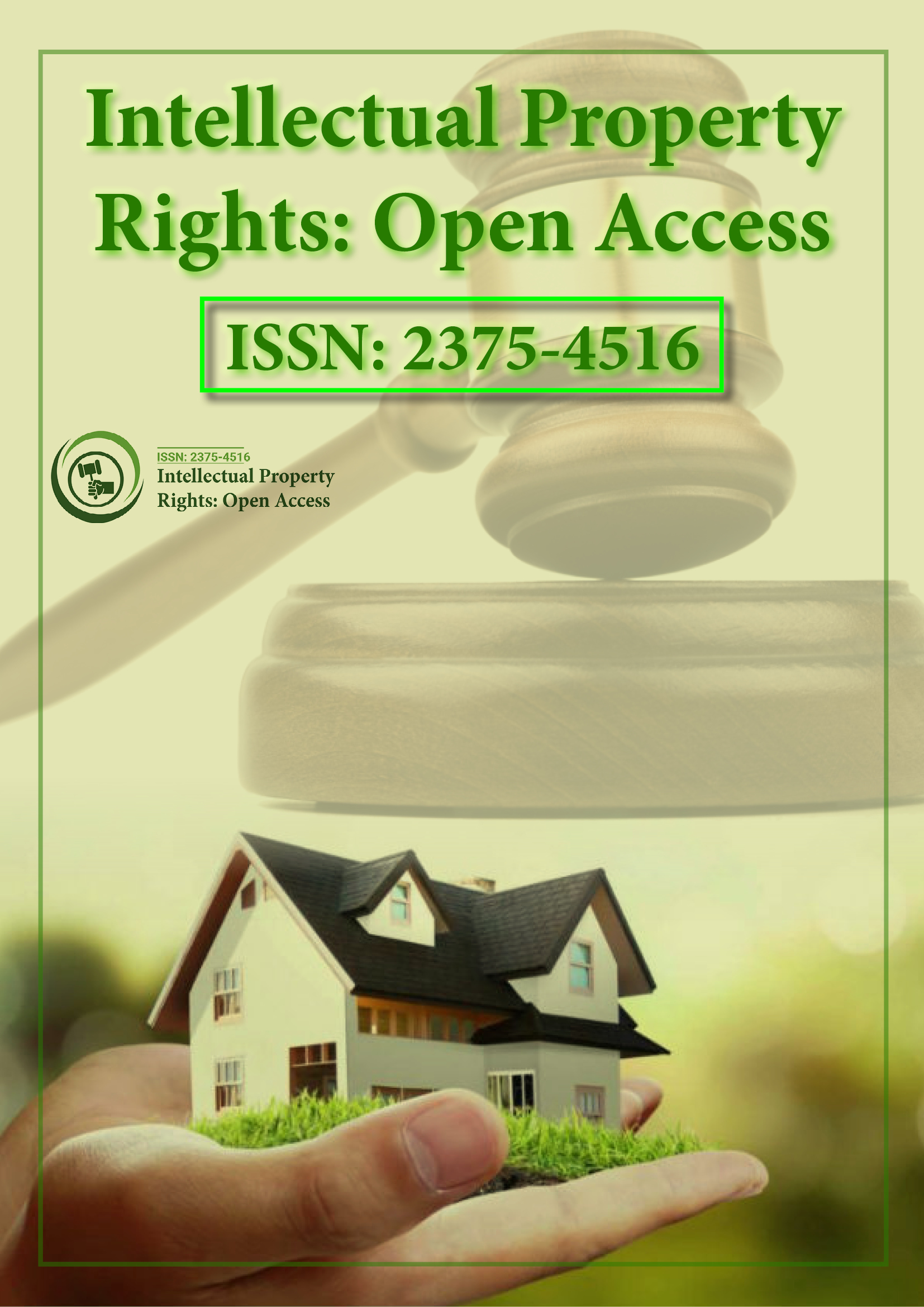Indexed In
- Open J Gate
- RefSeek
- Hamdard University
- EBSCO A-Z
- OCLC- WorldCat
- SWB online catalog
- Publons
Useful Links
Share This Page
Journal Flyer

Open Access Journals
- Agri and Aquaculture
- Biochemistry
- Bioinformatics & Systems Biology
- Business & Management
- Chemistry
- Clinical Sciences
- Engineering
- Food & Nutrition
- General Science
- Genetics & Molecular Biology
- Immunology & Microbiology
- Medical Sciences
- Neuroscience & Psychology
- Nursing & Health Care
- Pharmaceutical Sciences
Perspective - (2023) Volume 11, Issue 3
Advancing of Patent Trolls and their Impact on Intellectual Property
Ikea Taeshi*Received: 17-Aug-2023, Manuscript No. IPR-23-23332; Editor assigned: 21-Aug-2023, Pre QC No. IPR-23-23332 (PQ); Reviewed: 04-Sep-2023, QC No. IPR-23-23332; Revised: 11-Sep-2023, Manuscript No. IPR-23-23332 (R); Published: 19-Sep-2023, DOI: 10.35248/2375-4516.23.11.241
Description
The term "patent troll" has become a way in the broad and constantly expanding world of technology and invention, terrifying both startups and well-established businesses. This paper delves deep into the phenomenon of patent trolls, exploring their origins, modus operandi, the legal battleground they create, and the profound impact they have on the world of intellectual property and innovation.
Concept of patent trolls
A patent troll, also known as a Non-Practicing Entity (NPE), is an individual or an organization that acquires patents not for the purpose of creating products or services but solely for the intention of enforcing patent rights and generating revenue through lawsuits and licensing agreements. Unlike genuine innovators, patent trolls do not contribute to technological advancements or economic progress; instead, they exploit legal technicalities to extract money from businesses, often severe the very essence of innovation.
The modus operandi of patent trolls
Mass patent acquisition: Patent trolls often acquire a large number of patents, sometimes vague or overly broad, with the sole intention of targeting businesses that might unintentionally infringe on these patents in their day-to-day operations.
Lawsuits and legal threats: Patent trolls initiate lawsuits against alleged infringers, targeting a wide array of industries, from software and technology to healthcare and manufacturing. Even the threat of legal action can coerce companies, especially startups, into settling out of court to avoid expensive litigation.
Forum shopping: Patent trolls strategically file lawsuits in jurisdictions known for favoring patent holders, irrespective of where the alleged infringement occurred. This tactic increases their chances of winning legal battles and obtaining favorable settlements.
Demand letters and licensing agreements: Patent trolls often send intimidating demand letters to companies, alleging patent infringement and demanding hefty licensing fees. Many businesses, regardless of the validity of the claims, opt to settle to avoid the cost and hassle of litigation.
Challenges faced by businesses
Financial drain: Defending against patent troll lawsuits can be financially crippling for businesses, especially startups and small enterprises. Legal fees, court costs, and potential damages can drain resources, hindering their ability to invest in innovation and growth.
Innovation stifling: The constant threat of patent litigation stifles innovation by diverting resources away from research and development. Companies are forced to allocate budgets for legal defenses instead of investing in new technologies and creative endeavors.
Unclear patent boundaries: Patent trolls often exploit the ambiguity in patent boundaries and definitions, making it difficult for businesses to determine whether their products or processes infringe on existing patents. This uncertainty further complicates the landscape of intellectual property rights.
Impact of the recession on entrepreneurship: The fear of patent trolls and potential legal battles deters entrepreneurs from entering certain industries or developing specific technologies, preventing the natural flow of innovation and competition.
Legal reforms and strategies of patent troll
Legislative reforms: Many countries have recognized the patent trolls and have implemented legislative reforms to prevent their activities. Patent standards, transparency in patent ownership, and measures to deter lawsuits have been proposed and, in some cases, implemented.
Public awareness and education: Educating businesses, especially startups and small enterprises, about patent laws, their rights, and strategies to handle patent troll threats can empower them to respond effectively and protect themselves from unfair practices.
Patent quality improvement: Enhancing the quality of patents granted by patent offices can significantly reduce the scope for vague and overly broad patents that patent trolls often exploit. Rigorous examination processes can prevent weak patents from entering the legal battleground.
International cooperation: Collaborative efforts between countries to harmonize patent laws and regulations can create a unified front against patent trolls, making it more challenging for them to exploit legal loopholes in different jurisdictions.
Conclusion
The advancing of patent trolls poses a significant threat to innovation, entrepreneurship, and economic progress.
Addressing this challenge requires a multifaceted approach, including legal reforms, public education, and international cooperation. By fostering a supportive environment for innovation and ensuring a fair, transparent patent system, societies can protect inventors, encourage entrepreneurship, and promote technological advancements that benefit humanity as a whole.
In the face of patent trolls, vigilance, awareness, and a collective commitment to fostering genuine innovation are the keys to navigating the intellectual property and securing a brighter, more innovative future for all.
Citation: Taeshi I (2023) Advancing of Patent Trolls and their Impact on Intellectual Property. Intel Prop Rights. 11:241.
Copyright: © 2023 Taeshi I. This is an open access article distributed under the terms of the Creative Commons Attribution License, which permits unrestricted use, distribution, and reproduction in any medium, provided the original author and source are credited.
